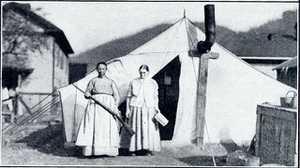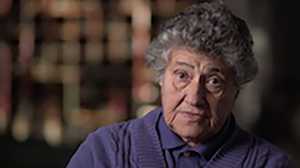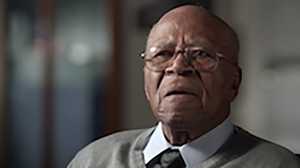Violence & Political Expression
From the Collection: Fighting for a More Perfect Union: Protest and Politics in AmericaEver since the United States won independence through armed revolution, Americans have grappled with the legitimacy of violence as a form of political expression and strategy. Rebellions and protest movements have shaken American society since the early republic, and the 2016 documentary The Mine Wars presents the story of West Virginia miners who believed a violent response was necessary to counter a force that imposed strict limits on their freedom. Below, scholars address the theme of violence, militancy and political struggle at the time of Mother Jones and the miners' unionization movement.

Chuck Keeney, Historian and Great-Grandson of Frank Keeney: When you're trying to explain the violence of the Mine Wars you have to ask, "What does it take for a citizen, a free individual who's not trained as a soldier, who's not in a military, to voluntarily pick up a gun and say, 'I'm going to take to the woods and I'm going to shoot people and I'm going to kill people?" And what circumstances do you have to live under in which you're willing to take up arms and kill other human beings, and not only kill them but do things like paste a sign on a [mine guard's] corpse that says, "Gone to hell. More to go"?

Beverly Gage, Professor of History at Yale University: How does an ordinary worker decide to become a militant worker or a militant member of a miner's union? You actually had this story told many, many times by many different figures in the late 19th century and [they explained it] as a process of experience and ideas. The experience was partly the brutality of the mines themselves, and many miners talked about what it was like, particularly to see other miners die around them, to experience a mine explosion, to see someone killed from disease, maybe someone that they cared about. And that was in itself often a radicalizing experience. The other experience that many people pointed to was what it was like to either participate in or witness a strike and find yourself not particularly political at that point but being thrown into the bullpen, having your rights taken away, being blackballed, or banned, or having people you know experience those things, spending months in jail. So that's the experience part of it. And then the ideas part is really about often mining towns, mining camps were actually very active places of political discussion and political life. You had lots of people coming, lots of people going, and some of those people brought messages of a revolution that was brewing halfway around the world. And they brought literature with them that suggested here are ways, in fact, to take these experiences that you're having and make them make sense and see your way to a better world in conversation with people around the world who are experiencing similar things. And so this blend of experience, and ideas, and of this kind of social ferment that was always kind of moving through the camps.

Denise Giardina, Author, The Unquiet Earth: Coal is by nature a violent industry, especially in those days, in the sense that you never knew when you walked in a mine whether or not you would walk out again, whether you would be crushed by a roof fall, or whether you'd be blown apart by an explosion. So you were living as a coal miner in a perpetual state of being threatened with violent death. And then when you walked out again, you had a company that had mine guards, and machine guns, and made it very clear to you from the beginning that you were perpetually under guard, that you were not allowed to talk to your neighbors in any large group, that your mail was being monitored. And so you were in a sort of a totalitarian situation and I think in that circumstance it was natural that the response would involve violence in some way. And you have to remember this is before Gandhi and King. This is before civil disobedience and, and so people fought back.
Paul Rakes: It's violence out of frustration and it's violence in retaliation to the violence that's visited on them. They're going to meet violence with violence. And by this time... they have developed a collective consciousness as miners -- "We all have this same problem," and violence becomes more of a tool... Groups of miners begin to realize, "We have this commonality here. We all are sharing this second-class citizenship... our rights are not recognized in the system." Then you have a group that's ready to do what they must do to deal with people who are violent toward them.
Beverly Gage: You didn't have a single idea of rebellion, or even of revolution, or liberation operating in the mining camps. You actually had many, many different types of people coming and so you had a lot of different ideas and a lot of different traditions. You might have Socialists who are from the American heartland, from West Virginia itself, who have been radicalized on American soil, maybe see themselves within a tradition of American rebellion. You have various immigrant workers who are coming bringing their own traditions and their own ideas. And then of course you have African Americans who have very recently, in their family memories, had a tradition of liberation, of to some degree rebellion, and of what it means to do work that is respected, that is worthwhile, and what a life worth living might mean in that context. And so what you really have is a whole brew of radical ideas and of different traditions mixing together in the mining towns and camps.
Chuck Keeney: I think the violence can largely be summed up in terms of desperation... when your children are sick and hungry for a long time and nobody's coming to help them, and people are terrorizing you with guns then it's, it's partly retaliation. You know, [the miners] felt as though they were retaliating against this system... it must also be understood that the coal companies did not shy away from the violence either. They treated the miners themselves brutally as a workforce. If you got caught talking, distributing Socialist literature, well, they might take you behind the railroad tracks and beat you senseless. If you got caught trying to talk about unionism, if you got talking about the wrong political candidate, if you got caught voting for the wrong person you could get a beating for this. And, you look throughout human history you don't get freedom without the shedding of blood. Freedom doesn't come without the shedding of blood. I don't know of any instance throughout world history where a place just became a democracy peacefully without anybody dying... for it, where people were able to get their rights without someone having to sacrifice and someone having to kill for it. That's an unfortunate aspect of humanity.
Beverly Gage: It's also worth noting that within American labor history, unions themselves were often quite strategic and quite willing to use violence in a variety of ways... workers... made a very powerful case that given the violence of American industry itself and given the violence of the companies and sometimes municipal police forces or state constabularies were brought in to repress the strike, that they had every right as working men to take up arms in self defense and to take up arms in order to defend their rights as American citizens to exercise free assembly, free speech, and to try to bring their employer into conversation over things like wages.
In many cases, violence was really a tactical question. What kind of violence would be effective? If it would be effective would it be defensive violence? Would it be offensive violence? In particular, would it actually serve the purpose that you wanted it to serve, or would it actually become a kind of discrediting tool that employers could use, that the government could use to undermine the kinds of claims to public sympathy or to treatment under the law that you were trying to make? Someone like Frank Keeney or a lot of Socialists, people on the Left in the early 20th century, wouldn't necessarily have said yes or no on the question of violence. They would have asked the question of what purpose it was going to serve. And many people openly identified themselves really as revolutionaries. They didn't see themselves necessarily as simply organizing against one employer or even organizing say against the United States government in some case, but they saw themselves as really part of a global movement in many cases that was going to transform the relationship between labor and capital that was actually going to produce a much better world for workers in the United States and around the industrialized world. So the question of whether you would use violence in your revolution was really a question of whether or not it would be useful and whether or not it would be necessary. And there was really a lot of open debate on this kind of question, some of it moral, some of it a question of whether taking up arms was just. But a lot of it really was about whether it was smart, whether it was the right approach to take depending on the enemy that you were facing.

Thomas Andrews, Author, Killing for Coal: America's Deadliest Labor War: This was a righteous struggle in their eyes. And I think one of the dangers of righteous struggles is that they give one a justification to embrace violence potentially. This country does have a history of political violence. It's not a history that we spend that much time thinking about. It's not a history that most of us embrace but it's very critical for understanding the late 1800s and early 1900s.







